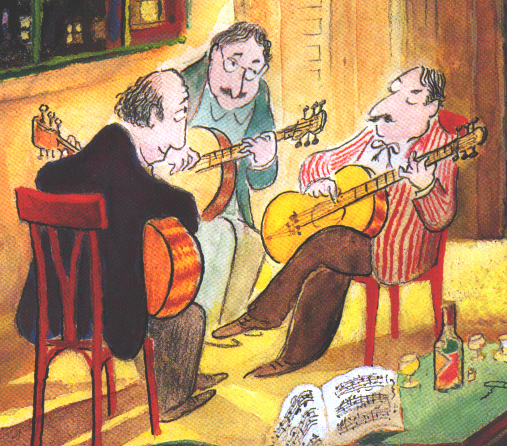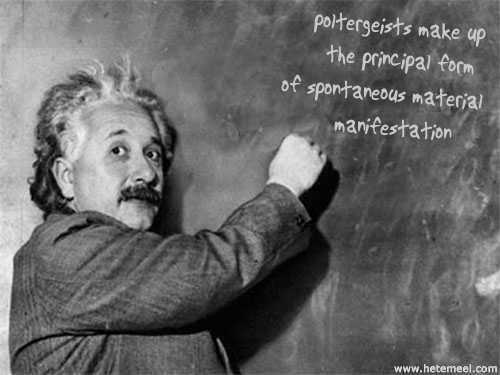
This bit of detail from this week’s New Yorker cover (by Jean-Jacques Sempé) seems like it was drawn with my peculiar sensibilities in mind. It took me about 1.5 seconds to recognize that and for the well-known lump to generate in the throat, but none of the several generally-astute-and-knowledgeable people I’ve shown it to have had anything like my reaction. They (the g-a-&-k persons) aren’t guitar players, but I wonder if the image is even more specifically targeted? It all hangs on (1) who the dude in the stripes is and (2) the precise placement of lines in the faces of the other two players.
There was a wonderful series of cartoons in the New Yorker in the 40s and 50s, captioned as Dreams of Glory, drawn by William Steig and depicting the fantasy lives of kids, who imagine themselves rescuing maidens from dragons or arresting Hitler with a cap gun… The two unstriped guitarists are the grownup versions of those kids. It’s just paralyzingly obvious that (1) the stripy guy is Django Rinehardt (look at the left hand, but take in as well the insouciance of the posture), and (2) the event of Django coming over to play music is in the realm of glorious fantasy…
Anyway, Sempé really GOT me with this one.
Monthly Archives: March 2006
links for 2006-03-09
-
uses Yahoo! Maps API to zoom to any of 20K US cities
Fantasy, and gaming?
Personally, I just don’t get it with games and gaming, and I never have. Two kindsa people in the world, right? But here’s a sentence from an essay on China Miéville that makes the light go on for a possible understanding of gaming-as-pedagogy:
…fantasy should become a way of arguing about our social condition, of re-presenting our dilemmas, and creating a space for the imagination in which we can identify new possibilities of action.
Henry Farrell, Fantasy Remade: China Miéville’s New Crobuzon novels
Here’s why Language Log is indispensable
I lead a sheltered life here in Splendid Otium ME 04860, and without Language Log I suspect I’d never have encountered The Eggcorn Database. Etymology:
In September 2003, Mark Liberman reported (Egg corns: folk etymology, malapropism, mondegreen, ???) an incorrect yet particularly suggestive creation: someone had written “egg corn” instead of “acorn”. It turned out that there was no established label for this type of non-standard reshaping. Erroneous as it may be, the substitution involved more than just ignorance: an acorn is more or less shaped like an egg; and it is a seed, just like grains of corn. So if you don’t know how acorn is spelled, egg corn actually makes sense.
And who knew that mondegreens were, well, mondegreens?
If your dictionary doesn’t include “mondegreen,” throw it out and buy a better one.
The term “mondegreen” was coined by Sylvia Wright in a 1954 Atlantic article. As a child, young Sylvia had listened to a folk song that included the lines “They had slain the Earl of Moray/And Lady Mondegreen.” As is customary with misheard lyrics, she didn’t realize her mistake for years. The song was not about the tragic fate of Lady Mondegreen, but rather, the continuing plight of the good earl: “They had slain the Earl of Moray/And laid him on the green.”
Victorian London
Diana Sinton points to Google Earth kmz file for Victorian London. Think of the possibilities…
Imminent Victorianism
Several odd twists of interests (and via Richard D. Altick’s Victorian People and Ideas: A Companion for the Modern Reader of Victorian Literature) led me to a reading of Lytton Strachey’s Eminent Victorians, a book I’ve owned at least once but hadn’t actually read. What a treat, what a wonderful romp through pecksniffianreligious manias and backstage politics of power. And how very a propos to culture wars of the present, in which a lot of the same cant is dressed up in new duds.
It’s difficult to select among the passages that might inspire you to read it (or read it again) for yourself, but I think this one is among the most inspired bits of naughtiness:
The Oxford Movement was now ended. The University breathed such a sigh of relief as usually follows the difficult expulsion of a hard piece of matter from a living organism, and actually began to attend to education. As for the Church of England, she had tasted blood, and it was clear that she would never again be content with a vegetable diet. Her clergy, however, maintained their reputation for judicious compromise, for they followed Newman up to the very point beyond which his conclusions were logical, and, while they intoned, confessed, swung incense, and burned candles with the exhilaration of converts, they yet managed to do so with a subtle nuance which showed that they had nothing to do with Rome. Various individuals underwent more violent changes. Several had preceded Newman into the Roman fold; among others an unhappy Mr. Sibthorpe, who subsequently changed his mind, and returned to the Church of his fathers, and then– perhaps it was only natural– changed his mind again. Many more followed Newman, and Dr. Wiseman was particularly pleased by the conversion of a Mr. Morris, who, as he said, was ‘the author of the essay, which won the prize on the best method of proving Christianity to the Hindus’. Hurrell Froude had died before Newman had read the fatal article on St. Augustine; but his brother, James Anthony, together with Arthur Clough, the poet, went through an experience which was more distressing in those days than it has since become; they lost their faith. With this difference, however, that while in Froude’s case the loss of his faith turned out to be rather like the loss of a heavy portmanteau, which one afterwards discovers to have been full of old rags and brickbats, Clough was made so uneasy by the loss of his that he went on looking for it everywhere as long as he lived; but somehow he never could find it. On the other hand, Keble and Pusey continued for the rest of their lives to dance in an exemplary manner upon the tight-rope of High Anglicanism; in such an exemplary manner, indeed, that the tightrope has its dancers still.
Since Eminent Victorians was first published in 1918, it’s well out of the copyright stranglehold and so is available online. I do wish I could get my paws on Oxford U.P.’s new edition, with annotations. Their summary of the book’s significance:
Lytton Strachey’s biographical essays on four ’eminent Victorians’ dropped a depth-charge on Victorian England when the book was published in 1918. It ushered in the modern biography and raised the genre to the level of high literary art. Lytton Strachey approached his subjects with scepticism rather than reverence, and his iconoclastic wit and engaging narratives thrilled as well as shocked his contemporaries. Debunking Church, Public School and Empire, his portraits of Cardinal Manning, Florence Nightingale, Dr Arnold of Rugby, and General Gordon of Khartoum changed perceptions of the Victorians for a generation.
Rural Maine isn’t a particularly good locale for finding a book like Eminent Victorians, but Camden’s ABCD Books had the Modern Library edition, complete with ca. 1955 dust jacket. Reading it in that clothing sure did take me back…
I’ve done some looking around for more or less current Web mentions of Eminent Victorians and found quite a few that enlarge on my own reading. One of the most useful is Martin Tulic’s Index to Eminent Victorians, which inspires a whole different sort of reading of the text. Also useful is Lincoln Allison’s posting (“Lincoln Allison has recently retired as Reader in Politics, University of Warwick. He is continuing his education by reading those classics he has previously neglected. His previous Retrospective Reviews can be read here“).
Toby Litt’s Cult Choice begins with this stirring sentence:
It would be an exaggeration, but only a slight one, to say that all contemporary non-fiction starts with Eminent Victorians…
And Paul Levy has a very nice piece in The Guardian (July 20, 2002): Rereadings: A string quartet in four movements …which provides a lot of useful background to how the book came to be written, and concludes with this Stracheyan postscript:
The standard historian’s complaint with the work has been that Strachey used only secondary sources, consulted no unpublished sources, and gave no references. Moreover, scholars have made specific complaints about the sources he did use. Modern scholarship holds that some of these objections are well-founded, others less so. But these are matters for specialists, providing them with gainful employment, and do not much affect the present-day reader’s enjoyment of the book.
R J Keefe’s Portico has a nice essay titled Victorians Immense, which characterizes Eminent Victorians as
a book that changed the shape of biography forever …In Eminent Victorians, Strachey combines heavy irony with boy’s-own-adventure writing to produce an account that can’t be put down…
Yup, that says it pretty well.
If you’ve got this far in this posting and have a taste for deflation of hypocrisies, you deserve a reward. Here it is, thanks to a link in today’s posting by Benjamin Zimmer on the absolutely essential Language Log: A Psalm of Montreal (Samuel Butler). Two delectable stanzas to convince you to read the whole thing:
“The Discobolus is put here because he is vulgar –
He has neither vest nor pants with which to cover his limbs;
I, Sir, am a person of most respectable connections –
My brother-in-law is haberdasher to Mr. Spurgeon.”
O God! O Montreal!Then I said, “O brother-in-law to Mr. Spurgeon’s haberdasher,
Who seasonest also the skins of Canadian owls,
Thou callest trousers ‘pants’, whereas I call them ‘trousers’,
Therefore thou art in hell-fire and may the Lord pity thee!”
O God! O Montreal!
Couldn’t resist
links for 2006-03-02
-
Wikipedia, Flickr, Delicious mashup tool
